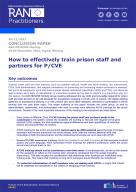Details
- Publication date
- 23 February 2022
- Author
- Directorate-General for Migration and Home Affairs
- RAN Publications Topic
- Prison and probation
Description
Training prison staff and their partners (such as probation officers, health and social workers, law enforcement, CSOs, local administration, and religious counsellors) on preventing and countering violent extremism is essential. Not just to be equipped to work with those inmates already radicalised (specifically VETOs and FTFs), but also to be able to detect early signs of radicalisation in vulnerable inmates and be able to respond in a preventive way.
For this reason, the RAN PRISONS Working Group meeting addressed the key skills and knowledge required for prison staff and their partners to be well equipped for successfully engaging in P/CVE work in prisons. The digital meeting gathered 22 practitioners working in or with prisons who have either designed, delivered or participated in P/CVE training over the past three years.
The target audience of this paper includes this same group, as well as administrators, researchers, and policymakers who want to create more effective P/CVE trainings for the prison environment. Several of the most important outcomes of the meeting to be considered are listed below.
- Every prison is different. Thus, P/CVE training for prison staff and partners needs to be customised to the specific context the recipients are working in. Not just with regards to the given national P/CVE context, but also considering regional differences and even specificities of individual prisons and characteristics of inmates.
- P/CVE training for the prison environment cannot easily be differentiated along the lines of primary, secondary and tertiary prevention but should always cover both the relevant personal skills and knowledge of both the phenomenon and the institutional structures set up to deal with P/CVE.
- General P/CVE awareness training should be provided to all staff in prisons so that everyone involved speaks the same language. More specialised P/CVE trainings for different professions within the prison environment should build on this.
- P/CVE training should not be considered a one-time event. A pre-assessment, as well as the chance for the recipients to reflect on the training later, should be considered from the outset (including supervision). This also includes the consideration that oftentimes when funding from institutions ends, training ends. This means that investing in long-term processes should therefore be considered.
- The potential radicalisation of staff members who are dealing with VETOs is a topic that should not be neglected and considered in the context of designing P/CVE training.
This paper outlines the highlights of the meeting and presents inspiring practices in the EU and beyond, followed by recommendations for what to consider when designing P/CVE trainings for prisons, both in terms of content and delivery.

